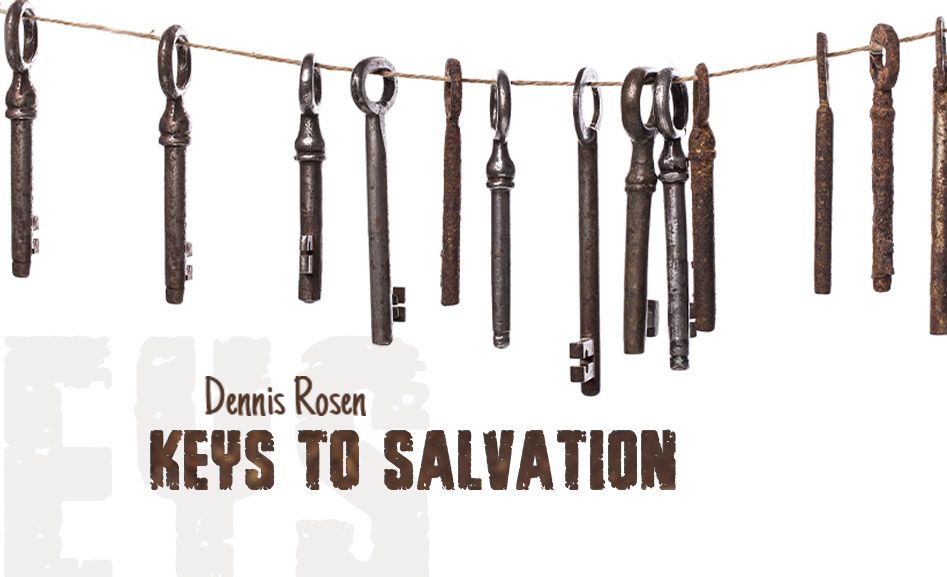
The Light of Torah
The light of Torah destroys the darkness of heresy. Oftentimes, so-called "religious" people harbor heretical ideas that resemble weeds in a garden...

Having already discussed Crying Out to Hashem, Speaking Words of Emuna, Self-evaluation, and Avoiding Reading Philosophy Books and Works of Heresy; we now continue with additional ways to build emuna.
Learning Torah
The light of Torah destroys the darkness of heresy.
People construe heresy, or apikorses, as total denial of Hashem; that’s not true. Oftentimes, so-called “religious” people harbor heretical ideas that resemble weeds in a garden. Learning Torah uproots these weeds.
Torah leads to emuna only when learned purely for the sake of performing Hashem’s Will and not for the sake of person gain. By learning Torah in order to implement Hashem’s Will, one attains emuna.
The light of Torah cleanses and illuminates the heart and soul, and makes them suitable receptacles for emuna. With emuna, the soul is an ideal vessel of Divine light.
Shmirat HaBrit or Guarding the Holy Covenant
Nothing destroys emuna like lewdness and licentiousness. The Torah tells of Err calling him “evil in the eyes of God” (Bereishit 38:7). Rashi explains that Err would spill his seed so that his wife wouldn’t become pregnant and her beauty would be preserved.
The Shulchan Oruch (Code of Jewish Law) states, “It is forbidden to spill one’s seed in vain, and this transgression is worse than all the sins of the Torah. As such, one may not thresh on the inside and sow seed on the outside. Those guilty of masturbation who spill seed in vain, not only have they done a heinous violation, but they are subject to excommunication” (Shulchan Oruch, Even HaEzer 23:1). Even though today’s religious courts no longer excommunicate people when a person commits a transgression that is subject to excommunication, Hashem turns a deaf ear to that person’s prayers.
The holy covenant means that we use our reproductive apparatus only in the performance of a mitzvah, which is either procreation, insuring marital bliss, or both. The guarding of the Holy Covenant, or Shmirat HaBrit, is probably the most conducive factor in attaining and preserving emuna.
Kedusha, or holiness of thought, speech, and deed, is the best way of guarding the Holy covenant. The more we immerse ourselves in Torah and the less we expose ourselves to the influences of today’s lewd and permissive society, the better we guard the Holy Covenant. Practically, one should marry at an early an age as possible, avoid looking at other women, and avoid looking at the media. Since the eyes are the window of the soul, seeing lewd and forbidden images immediately soils the soul. For that reason, both the Torah and the Shulchan Oruch specifically and emphatically require us to avoid looking at any woman other than our mothers, wives, and daughters. Our Sages teach that merely harboring the image of a strange woman in one’s brain is tantamount to mental adultery (see Rambam, Laws of Teshuva, 4:4).
Lewd thoughts and unclean speech lead to violations of the Holy Covenant, since they defile the brain and the mouth. The brain was designed for contemplating Torah and Hashem, and the mouth was designed for speaking Torah and praying. A mouth that has been contaminated with unclean and lewd speech can’t pray properly; using such a mouth for prayer is like using one’s toilet as a soup bowl. Even if the toilet were crystal clean and disinfected, who would want to eat from a toilet bowl? In like manner, Hashem doesn’t want to hear the prayers of a mouth that’s used for lewd and forbidden speech.
Masturbation and spilling one’s seed lead to a sealing of the heart and the brain from Divine light. That’s why emuna and debauchery are mutually exclusive. As we’ve learned earlier in this book, emuna is conducive more than anything else to a good income. Therefore, debauchery – the opposite of Shmirat HaBrit – causes financial difficulties and destroys one’s livelihood.
All the wonderful benefits of emuna that we’ve learned previously in this book are destroyed when one fails to guard the Holy Covenant. For example, emuna brings a person to spiritual awareness and to happiness. A breach of one’s Holy Covenant destroys emuna and leads directly to sadness, depression, and other emotional problems.
Adultery, a flagrant breach of the Holy Covenant, goes against all the principles of Judaism and emuna. Nothing severs a person so fast from Hashem as adultery. As such, the wicked Bilaam advised Balak, the king of Moab, that if he couldn’t overcome Israel by military means, then all he had to do was to tempt them with licentiousness.
The Zohar says that a person’s principal test in the world is to overcome the lust for adultery. From a spiritual standpoint, adultery begins way before the forbidden act – as soon as a person looks at someone else’s spouse or contemplates adultery in any way, the eyes and the mind become spiritually contaminated. Such contamination destroys the soul, Heaven forbid.
Our Sages teach us that what the eye sees, the heart desires. Therefore, by guarding the sight of our eyes and by limiting our gaze to the permissible, we protect ourselves from falling into the trap of lustful desires. Lustful desires alone are enough to wreak havoc on the soul. Also, lustful desires are the spiritual opposite of the love of Hashem – one can’t have both. A person can’t have lustful desires and cling to Hashem simultaneously. Stop and think – is a lustful thought or desire worth being separated from Hashem?
The Land of Israel
The Gomorrah teaches that one can’t fully attain emuna outside the context of the Land of Israel. Therefore, one who truly desires emuna should pray to Hashem for the privilege of coming to Eretz Yisrael, and meanwhile, should long to be in the Land of Israel.
Clinging to Hashem
The Gomorrah asks a question: It’s a mitzvah to cling to Hashem, yet Hashem is like an all-consuming fire; so, who can cling to Him?
The Gomorrah answers its own question and says, by clinging to Torah scholars and tzaddikim that teach the way of Hashem, one clings to Hashem.
Religious law requires us to cling to our wise men and to heed their words. A substantial portion of the Torah comes under the classification of Oral Law, which has been passed on from teacher to pupil in one generation after the next, in an unbroken chain that dates back to Moses on Mount Sinai, who received the oral elaboration of the Torah directly from Hashem. Therefore, a person shouldn’t think that it’s sufficient to teach himself Torah – there’s much room for error; one avoids error by clinging to a righteous scholar and learning from him.
In like manner, one cannot fully attain emuna without clinging to the righteous spiritual leaders of the generation, what we refer to as emunat chachamim, or belief in our Sages. Without emunat chachamim, one cannot properly develop emuna in Hashem.
Studying the works of the true tzaddikim is highly conducive to emuna, for the writings of a true tzaddik arouse one’s heart to seek Hashem and to cling to Him. Like all other holy books, a person should learn the works of a tzaddik with the help of one of the tzaddik’s learned disciples to avoid confusion or misunderstanding. By establishing a relationship with the tzaddikim’s disciples, one is able to cling to the tzaddik and subsequently enhance emuna.
Rebbe Nachman of Breslev writes in Sefer HaMiddot (under the subject “tzaddik”):
* The main perfection of the soul is contingent on getting close to tzaddikim.
* The proximity of tzaddikim is beneficial in this world and in the next.
* The coming of Mashiach depends on getting close to the tzaddik.
* Those who are close to the tzaddik in their lifetime will be close to him after they die.
* That which you hear from the mouth of the tzaddik is more beneficial than that which you learn in books.
* It’s good to invest a lot of time in order to merit one hour of proximity to the tzaddik.
For all the above-mentioned reasons, one must search for a genuine, righteous tzaddik and spiritual guide. By clinging to such a person and by learning from him, one attains emuna.
Strengthening Emuna
Reb Natan of Breslev writes: “I heard that the Rebbe was once encouraging a man who was greatly confused about emuna. The Rebbe told him, ‘It is written that all creation came into being only because of people like you. God saw that there would be people who would cling to our Holy faith, suffering greatly because of the confusion and doubts that constantly plague them. He perceived that they would overcome these doubts and remain strong in their beliefs. It was because of this that God brought forth all creation’ ” (Rebbe Nachman’s Discourses 222).
Reb Nosson adds, “This man was then greatly strengthened and unperturbed whenever he had these confusing thoughts. The Rebbe said many times that the creation was mainly for the sake of faith. Thus it is written, ‘All His works are through emuna’ ” (Tehillim 33:4).
Rebbe Nachman of Breslev’s teachings are masterful in strengthening emuna. In Discourse 35, Reb Nosson writes: “The Rebbe said, ‘A great atheism is coming to the world.’ Many times he told us that the world’s many sins are resulting in great disbelief. Happy is he who is strong in emuna.
“The Rebbe said that the fact that he is predicting this will not prevent this Godlessness and confusion from increasing. Thousands of years ago, [the prophet] Daniel and others predicted that this would happen in the days before Mashiach. They said, ‘Many will purify themselves and be refined, and make themselves shining white. The wicked will be evil, and only the wise shall understand’ (Daniel 12:10).
“It has already been predicted that there will be great temptations before Mashiach’s coming, when ‘many will purify themselves and be refined, and make themselves shining white’ in faith. Fortunate indeed is one who resists these temptations and remains firm in his emuna. He will be worthy of all the good promised to us by the prophets and sages of old. Knowing full well that this has already been predicted, it would seem ridiculous for one to succumb to any temptation to abandon his beliefs. It would seem obvious that every Jew would have enough intelligence to remain firm. But still it is a great trial. Many will fall away, and for this reason it is written that ‘the wicked will be evil.’ The Rebbe said, ‘Still, I am revealing this for the sake of the few faithful who will remain strong in their emuna. They will certainly have great conflicts. But when they see that this has already been predicted, it will give them additional strength and encouragement.’ “
From the above discourse, we see that the only way to save ourselves from the perilous sea of heresy and disbelief is to learn as much as we can about emuna, and to constantly reinforce it. More than anything, we should consistently pray to Hashem for more and more emuna and invest our principal efforts in attaining and strengthening emuna. Our lives in this world and in the next depend on emuna.
Collection of Thoughts from Sefer HaMidot
Factors Detrimental to Emuna
- Hardening one’s heart
- Violating the Laws of Torah
- Jealousy, anger, and covetousness
- Disdain of Torah scholars
- Dishonesty and flattery
Factors Conducive to Emuna
- Modesty and humility
- Tearful prayer
- Silence
- Charity
- Sleeping in holiness









Tell us what you think!
Thank you for your comment!
It will be published after approval by the Editor.